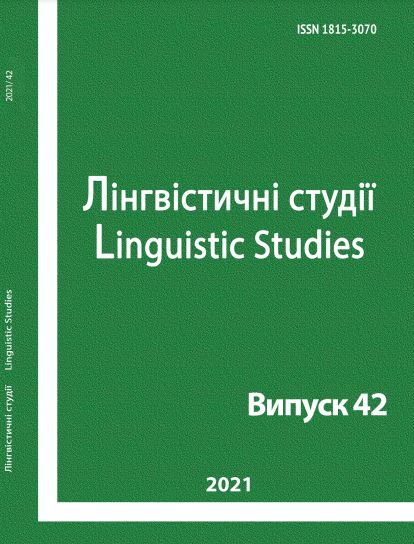Present day word formation tendencies
DOI:
https://doi.org/10.31558/1815-3070.2021.42.3Keywords:
new roots; new coinage; neologisms; word formation types; semantic derivationAbstract
The research endeavours to analyse present-day tendencies in word-building and to detect the coinage of new roots among the new words and expressions, attested by the Oxford English Dictionary in March and June updates of 2019 which were not available in the previous editions.
References
Antrushina, G., Afanasyeva, O., Morozova, N. Lexicology of English Language. Moscow: Drofa, 2001. 100 p. Print.
Barbora, V. «On the formation of colloquial neologisms in the area of contemporary TV shows’ audience» [In] The European Journal of Literature and Linguistics, Issue 1, 2016: 3–7. URL: http://ppublishing.org/journals/401/issue/670/articles/647/ 30 Aug. 2021
Chumak, Liudmila M. «Linguopragmatic aspects of the process of constructing lexical innovations in modern English media discourse» URL: http://zfs-journal.uzhnu.uz.ua/archive/13/ part_2/38.pdf
Guerra, A. R. «Dictionaries of Neologisms: a review and proposals for its improvements». [In:] De Gruyter open 2016. URL: https://www.researchgate.net/publication/311499466_Dictionaries_ of_Neologisms_a_Review_and_Proposals_for_its_Improvement 30 Aug. 2021
Ivanova, E. Lexicology and Phraseology of Modern English. Moscow: Academia, 2011. Print.
Janssen, M. Orthographic Neologisms. Selection Criteria and Semi-Automatic Detection [In;] Instituto de Linguística Teórica e Computacional Rua Conde de Redondo. Lisbon, Portugal, 2005. URL: http://maarten.janssenweb.net/Papers/neologisms.pdf.30 Aug. 2020
Januševa, V., & Jurukovska, J. «Conceptual formulation of neologisms in various dictionaries and primary school Macedonian language course textbooks». Journal of Language and Linguistic Studies 11(2), 2015: 99–116. URL: https://files.eric.ed.gov/fulltext/EJ1105185.pdf 30 Aug. 2019
Karpilovska, Y. «Modern Ukrainian Word-Building and its Reflection in Neological Dictionaries» [In:] Visnyk Lviv Univ. ser. Philology 1, 2004: 3–10. Print.
Kemmer, S. «Types of word-formation processes» 2020. URL: https://www.ruf.rice.edu/~kemmer/Words/wordtypes.html 30 Aug. 2020
Nickolenko, A. Lexicology of English Language – Theory and Practice. Vinnytsya: Nova Knyga, 2007. Print.
Peftieva O. F. «Does the humanity coin new roots?» [In:] Abstract Digest of the IV International Scientific and Practical Internet Conference “Current Issues of Intercultural Communication, Translation and Comparative Studies” 2020: 30–134. (Preprint. Mariupol state university). URL: http://mdu.in.ua/Nauch/Konf/2020/mizhkulturna_komunykacija-2020.pdf 3 Jun. 2021
Peftieva, O. F. «Searching New Roots Among Lexical Units (attested by Oxford English Dictionary in the first half of 2019)» [In:] Current Problems Of Science And Education: Abstract digest of the XXII scientific conference of Mariupol State University staff 2020: 217–218. (Preprint. Mariupol). URL: http://mdu.in.ua/Nauch/Konf/2020/zbirka_aktualni_problemi_nauki_ta_ osviti_2020.pdf 3 Jun. 2021
Ratih, E. et al. «Word- formation Processes in English New Words of Oxford English Dictionary (OED) online» 2018 URL: https://www.researchgate.net/publication/331870463_word_ formation_proces ses_in_english_new_words_of_oxford_english_dictionary_oed_online 20 Jan. 2019
Schmid, H. «New Words in the Mind: Concept-formation and Entrenchment of Neologisms» [In:] Anglia 126(1), 2008: 1–36. URL: https://www.researchgate.net/publication/ 270487792_ New_Words_in_the_Mind_Concept-formation_and_Entrenchment_of_Neologisms 15 Sep. 2020
Rayevska N. М. English Lexicology. Kyiv, Vyshcha shkola, 1979. Print.
Yeliseeva, V. V. Lexicology of English Language. St. Petersburg, 2003. 44 p. Print.
Zapata, Becerra, A. A. «Handbook of general and applied linguistics» [In:] Venezuela: Escuela de Idiomas Modernos, Universidad de Los Andes 2000. URL: http://webdelprofesor.ula.ve/humanidades/azapata/materias/english_4/unit_1_types_of_words_and_word_formation_processes.pdf 03 Jun. 2019


